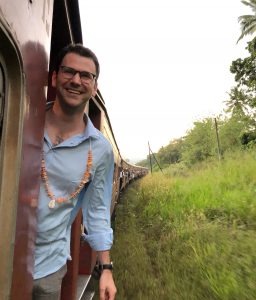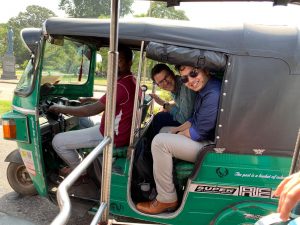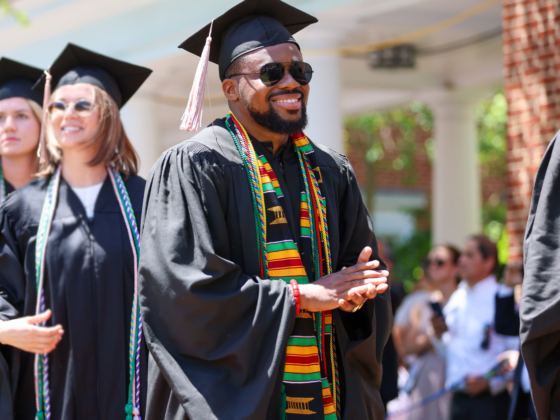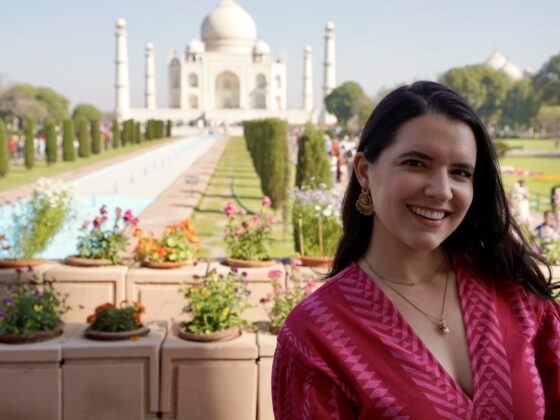 Ben Leiner (Class of 2019) was born and raised in Baltimore, MD and graduated from Emory University. Before Darden, Ben worked in market research at a political polling firm and at the Atlantic Media Company. He also served as executive director of My Ride to Vote, an advocacy organization that partnered with rideshare companies to fund rides to the polls for low-income voters on Election Day.
Ben Leiner (Class of 2019) was born and raised in Baltimore, MD and graduated from Emory University. Before Darden, Ben worked in market research at a political polling firm and at the Atlantic Media Company. He also served as executive director of My Ride to Vote, an advocacy organization that partnered with rideshare companies to fund rides to the polls for low-income voters on Election Day.
Currently a second-year student at Darden, Ben interned in product marketing at Atlassian, an enterprise software company based in Sydney, Australia. After business school, he hopes to work at a company using technology to improve civic life and strengthen democracy in the United States and abroad.
Could you share a little bit about your global experiences prior to arriving at Darden?
Before Darden, I had some travel experience, but not a ton. I had traveled to Europe for some personal travel and attended a six-week summer study abroad program in Paris through Emory, where I did my undergrad.
Through Darden, I attended a first-year global immersion course in Sweden, where we studied entrepreneurship and innovation. That class, along with some travel on either end, really gave me a “travel bug” and a desire to explore the world.
Darden offers quite a few different global immersion courses. What drew you to Singapore and Sri Lanka?
There were several reasons I decided to travel to Singapore and Sri Lanka. I had never been to Asia and wanted to explore that part of the world. I didn’t think of either country as a typical tourist destination – if I hadn’t traveled to them through Darden, I’m not sure I would have ever gone. Given my professional background in politics and advocacy, I loved the topic (“Navigating Difficult Waters: Addressing Tough Problems in Business and Society”). And, perhaps most important, I traveled with Professor Marc Modica to Sweden and find him to be an excellent person to travel with.
Singapore and Sri Lanka course is neat in that it offers a chance to compare two very different places and economies in one program. What did you learn through that process of comparison?
A truly difficult question given all that we learned over just ten days. But I’ll give it a go.
I think my best answer is that leadership really matters. Both Singapore and Sri Lanka came into being since World War II and both have faced their challenges. However, at a high level, the story of Singapore’s success relative to Sri Lanka’s struggles has been the character and the quality of each country’s leadership. Successful national leaders articulate a country’s aspirations, set ethical standards for how government, business, and society should interact, and outline an inclusive form of patriotism that recognizes the country’s diversity. Both countries provided contrasting examples of how leaders have succeeded and failed across these goals.
Whether we Darden students end up leading companies or countries, the course taught us the consequences of successful and unsuccessful leadership and forced us to consider how we can and should lead in our own professional lives.
As you head into the last few months of your Darden experience and start to think about what you’ll be doing after graduation, what did you learn through the Singapore and Sri Lanka course that you think will be most applicable when you start working?
Culture matters, and it’s set by individuals. Any culture has strengths and weaknesses as they relate to creating value for society. As an early-career employee, I might not have as much power as a CEO to systemically address the flaws in my company’s culture. However, through my own conduct, I can reinforce the qualities and values that improve the culture. As I grow in my career, I hope to refine my own beliefs as I exert more influence over the culture of the organizations I join.
I may have been able to articulate that lesson before traveling to Singapore and Sri Lanka with Darden. However, I did not have as deep an understanding of the consequences of successful or dysfunctional leadership. The course also showed me that I had been defining “success” in an American context as it related to American business. These countries showed me several different ways to define successful culture that are decidedly non-American.
Any advice for prospective MBA students or first year students who are planning global experiences during their MBA degree?
There’s a difference between vacation and travel. You have your whole life to take vacations to parts of the world that make you comfortable – there’s a beach everywhere.
When you travel during your MBA, take advantage of opportunities to travel – to challenge your assumptions, ask tough questions, and perhaps be uncomfortable. If you do that, you’ll come back having expanded your mind, stretched yourself, and gained a stronger understanding of how you can make a difference throughout your career.
Maybe you’ll even ride a few tuk-tuks. If you do, take a negotiations course first. It’ll help with the haggling.





